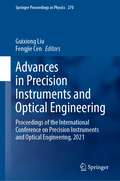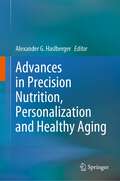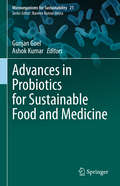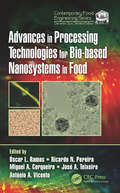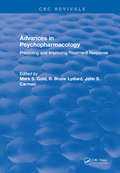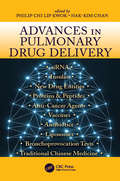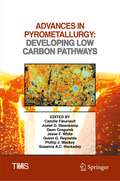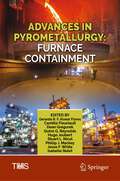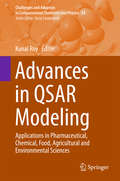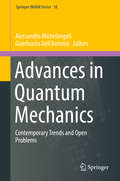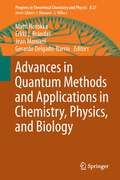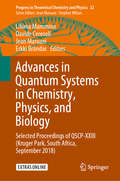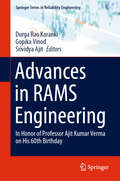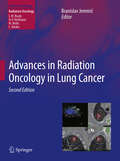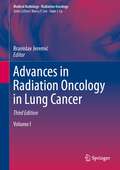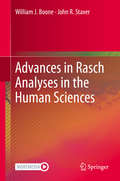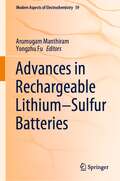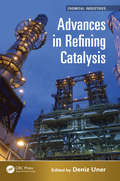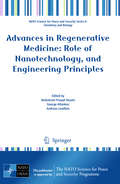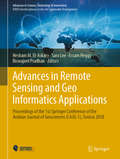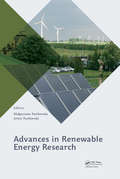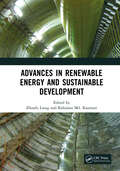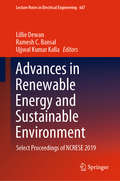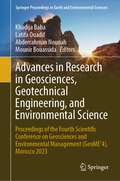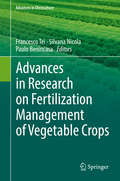- Table View
- List View
Advances in Precision Instruments and Optical Engineering: Proceedings of the International Conference on Precision Instruments and Optical Engineering, 2021 (Springer Proceedings in Physics #270)
by Guixiong Liu Fengjie CenThis book highlights the new technologies and applications presented at the 2021 International Conference on Precision Instruments and Optical Engineering held in Chengdu, China from 25 to 27 August 2021. The conference aimed to provide a platform for researchers and professionals to share research findings, discuss cutting-edge technologies, promote collaborations and fuel the industrial transition of new technologies. The invited and contributed papers covered recent developments in optoelectronic devices, nanophotonic research, optoelectronic materials, precision instruments, intelligent instruments, laser technology, optical spectroscopy and other optical engineering topics. The book is intended for researchers, engineers and advanced students interested in precision instruments and optical engineering and their applications in diverse fields.
Advances in Precision Nutrition, Personalization and Healthy Aging
by Alexander G. HaslbergerThis book provides an overview on current trends and developments in precision nutrition and personalized health preservation, focussing on a field which is undergoing rapid change. Today, personalized strategies contrast generally accepted guidelines for specified groups and improved health and disease markers are shifting health care toward preventive strategies. At the same time, advances in food additives, nutraceuticals, functional, and medical foods are breaking down the traditional domains of health-related disciplines. This book aims to provide an overview on these processes, discusses arising problems, and provides an outlook on the future of personalized health care and the role of precision nutrition. It covers preliminary thoughts on what has been achieved and focusses on developments in the area of metabolic diseases, aging, and neurology. The book is intended as a primer in the field of precision nutrition and is aimed at researchers, clinicians, and students in health-related disciplines, who would like to get insights into current trends and developments in this area
Advances in Probiotics for Sustainable Food and Medicine (Microorganisms for Sustainability #21)
by Ashok Kumar Gunjan GoelThis book focuses on probiotics as sustainable foods and medicines, discussing issues such as screening and identification of probiotics, health claims, and advances in processing technologies, as well as food safety. Based on sound scientific research, the book is a unique reference resource for food scientists interested in development of probiotic based functional foods and their marketing. It will also appeal to those working in the area of regulations regarding the use of and health claims for fermented foods, both locally and globally.
Advances in Processing Technologies for Bio-based Nanosystems in Food (Contemporary Food Engineering #1)
by António A. Vicente Óscar L. Ramos Ricardo N. Pereira Miguel A. Cerqueira José A. TeixeiraNanotechnology can be used to address challenges faced by the food and bioprocessing industries for developing and implementing improved or novel systems that can produce safer, nutritious, healthier, sustainable, and environmental-friendly food products. This book overviews the most recent advances made on the field of nanoscience and nanotechnology that significantly influenced the food industry. Advances in Processing Technologies for Bio-Based Nanosystems in Food provides a multidisciplinary review of the complex mechanisms involved in the research, development, production and legislation of food containing nanostructures systems. Features: Presents the most recent advances made in the field of nanoscience and nanotechnology as applied to the food industry Discusses innovative approaches and processing technologies Shows how nanotechnology can be used to produce safer, nutritious, healthier, sustainable and environmental-friendly food products Covers the complex mechanisms involved in the research, development, production and legislation of food containing nanostructures Selected examples of nanotechnology applications in food industry are shown, focusing on advanced aspects of food packaging, processing and preservation; followed by one contribution that presents the potential commercialization and the main challenges for scale-up. Comprised of 15 chapters, this book provides much-needed and up-to-date information on the use of emergent technologies in bio-based nanosystems for foods, and serves as an ideal reference for scientists, regulators, industrialists, and consumers that conduct research and development in the food processing industry.
Advances in Psychopharmacology: Improving Treatment Response
by Mark S. GoldThe book focuses on the prediction and optimization of pharmacological treatment of psychiatric patients. Topics covered include the importance of accurate psychiatric diagnosis, medical problems which can mimic psychiatric illness, and the interface between psychiatric illness and opiate addiction and alcoholism. Current literature on predicting responses to antidepressants, lithium, antipsychotics and antianxiety agents is summarized. This practical guide also offers details on the state-of-the-art uses of blood levels in psychiatric practice for each class of drugs as well as other useful information in tables, graphs and flow charts.
Advances in Pulmonary Drug Delivery
by PHILIP CHI LIP KWOK AND HAK-KIM CHANThe respiratory tract has been used to deliver biologically active chemicals into the human body for centuries. However, the lungs are complex in their anatomy and physiology, which poses challenges to drug delivery. Inhaled formulations are generally more sophisticated than those for oral and parenteral administration. Pulmonary drug development is therefore a highly specialized area because of its many unique issues and challenges. Rapid progress is being made and offers novel solutions to existing treatment problems. Advances in Pulmonary Drug Delivery highlights the latest developments in this field.
Advances in Pyrometallurgy: Developing Low Carbon Pathways (The Minerals, Metals & Materials Series)
by Dean Gregurek Camille Fleuriault Jesse F. White Joalet D. Steenkamp Quinn G. Reynolds Phillip J. Mackey Susanna A.C. HockadayCarbon intensive industries are at a crossroads. Long-term manufacturing plans using pyrometallurgical processes all include decarbonization levers: we must solve the problem of fossil-based reduction and fossil-based power generation processes for metals production. This collection explores innovative and diverse strategies for the enablement of low carbon industries in the high-temperature metals and materials processing fields. In particular, the following processes are investigated:· Electrolysis and electrification of metallurgical processes · High-temperature electrolytic routes for metal and alloy production · Use of hydrogen and other alternative non-carbonaceous reducing agents · Biofuels and other non-fossil reagents for metallurgical applications · Direct and indirect use of solar energy in high-temperature processing · Energy efficiency and waste heat recovery concepts applied to pyrometallurgical operations
Advances in Pyrometallurgy: Furnace Containment (The Minerals, Metals & Materials Series)
by Dean Gregurek Camille Fleuriault Jesse F. White Quinn G. Reynolds Hugo Joubert Phillip J. Mackey Gerardo R. F. Alvear Flores Stuart L. Nicol Isabelle NoletThis collection explores the methods and challenges of containing corrosive and abrasive materials at extreme temperatures, whether they are used across commodities or technology specific. There is much to be learned from cross-commodity and cross-technology perspectives and this collection creates a platform for the exchange of ideas on the challenges, solutions, failures, and successes in furnace containment designs and applications while bringing together perspectives from industry, design houses, and research institutions. Topics include, but are not limited to: · Advances in furnace lining design philosophies · Advances in furnace design configurations and other design considerations · Problems experienced and their solutions implemented during construction and commissioning · Integration of new concepts into old smelters · Back to basics: refractory materials, shells, and cooling systems · Maintaining and monitoring · Process control and slag design · Lessons learned
Advances in QSAR Modeling: Applications in Pharmaceutical, Chemical, Food, Agricultural and Environmental Sciences (Challenges and Advances in Computational Chemistry and Physics #24)
by Kunal RoyThe book covers theoretical background and methodology as well as all current applications of Quantitative Structure-Activity Relationships (QSAR). Written by an international group of recognized researchers, this edited volume discusses applications of QSAR in multiple disciplines such as chemistry, pharmacy, environmental and agricultural sciences addressing data gaps and modern regulatory requirements. Additionally, the applications of QSAR in food science and nanoscience have been included - two areas which have only recently been able to exploit this versatile tool. This timely addition to the series is aimed at graduate students, academics and industrial scientists interested in the latest advances and applications of QSAR.
Advances in Quantum Mechanics: Contemporary Trends and Open Problems (Springer INdAM Series #18)
by Alessandro Michelangeli Gianfausto Dell’antonioThis volume collects recent contributions on the contemporary trends in the mathematics of quantum mechanics, and more specifically in mathematical problems arising in quantum many-body dynamics, quantum graph theory, cold atoms, unitary gases, with particular emphasis on the developments of the specific mathematical tools needed, including: linear and non-linear Schr#65533;dinger equations, topological invariants, non-commutative geometry, resonances and operator extension theory, among others. Most of contributors are international leading experts or respected young researchers in mathematical physics, PDE, and operator theory. All their material is the fruit of recent studies that have already become a reference in the community. Offering a unified perspective of the mathematics of quantum mechanics, it is a valuable resource for researchers in the field.
Advances in Quantum Methods and Applications in Chemistry, Physics, and Biology (Progress in Theoretical Chemistry and Physics #27)
by Jean Maruani Erkki J. Brändas Gerardo Delgado-Barrio Matti HotokkaAdvances in Quantum Methods and Applications in Chemistry, Physics, and Biology includes peer-reviewed contributions based on carefully selected presentations given at the 17th International Workshop on Quantum Systems in Chemistry, Physics, and Biology. New trends and state-of-the-art developments in the quantum theory of atomic and molecular systems, and condensed matter (including biological systems and nanostructures) are described by academics of international distinction.
Advances in Quantum Systems in Chemistry, Physics, and Biology: Selected Proceedings of QSCP-XXIII (Kruger Park, South Africa, September 2018) (Progress in Theoretical Chemistry and Physics #32)
by Jean Maruani Liliana Mammino Davide Ceresoli Erkki BrändasThis edited, multi-author book gathers selected, peer-reviewed contributions based on papers presented at the 23rd International Workshop on Quantum Systems in Chemistry, Physics, and Biology (QSCP-XXIII), held in Mopani Camp, The Kruger National Park, South Africa, in September 2018. The content is primarily intended for scholars, researchers, and graduate students working at universities and scientific institutes who are interested in the structure, properties, dynamics, and spectroscopy of atoms, molecules, biological systems, and condensed matter.
Advances in RAMS Engineering: In Honor of Professor Ajit Kumar Verma on His 60th Birthday (Springer Series in Reliability Engineering)
by Srividya Ajit Durga Rao Karanki Gopika VinodThis book surveys reliability, availability, maintainability and safety (RAMS) analyses of various engineering systems. It highlights their role throughout the lifecycle of engineering systems and explains how RAMS activities contribute to their efficient and economic design and operation. The book discusses a variety of examples and applications of RAMS analysis, including: • software products; • electrical and electronic engineering systems; • mechanical engineering systems; • nuclear power plants; • chemical and process plants and • railway systems. The wide-ranging nature of the applications discussed highlights the multidisciplinary nature of complex engineering systems. The book provides a quick reference to the latest advances and terminology in various engineering fields, assisting students and researchers in the areas of reliability, availability, maintainability, and safety engineering.
Advances in Radiation Oncology in Lung Cancer (Medical Radiology)
by Branislav JeremicThis is the second, completely updated edition of a comprehensive book in which many of the world's leading lung cancer specialists discuss the recent advances in the radiation oncology of lung cancer and reflect on the latest research findings. The first three sections cover the basic science of lung cancer, clinical investigations, including histology and staging, and a wide range of fundamental treatment considerations. Current treatment strategies for small cell and non-small cell lung cancer are then explained and evaluated in detail, with due attention to novel approaches that promise further improvements in outcome. The various types of treatment-related toxicity are discussed, and quality of life studies and prognostic factors are also considered. After evaluating the latest technological and biological advances, including IMRT, IMAT, cyber knife treatment, and tomotherapy, the book concludes by thorough consideration of specific aspects of clinical research in lung cancer.
Advances in Radiation Oncology in Lung Cancer (Medical Radiology)
by Branislav JeremićThis is the third, completely updated edition of a comprehensive book in which many of the world’s leading lung cancer specialists discuss the recent advances in the radiation oncology of lung cancer and reflect on the latest research findings in lung cancer and other intrathoracic malignancies. Lung cancer remains the major cancer killer in both sexes worldwide. It is so despite significant progress in recent decades in both diagnostic and treatment approaches. New biological and technological advances in this field are now faster incorporated in the overall decision-making process and are bringing fast and substantial improvements in both survivals and quality of life of lung cancer patients. Optimized patient-oriented approaches are reality of the third decade of this millennium and thoracic oncologists strive towards nothing but seamlessly delivering it in a continuous battle with lung cancer. The first three sections of the work cover the basic science of lung cancer, clinical investigations, including histology and staging, and a wide range of fundamental treatment considerations. Current treatment strategies for small cell and non-small cell lung cancer as well as other intrathoracic malignancies are then explained and evaluated in detail, with due attention to novel approaches that promise further improvements in outcome. The various types of treatment-related toxicity are discussed, and quality of life studies and prognostic factors are also considered. After evaluating the latest technological and biological advances, including stereotactic radiotherapy, and particle therapy, the book concludes by thorough consideration of specific aspects of clinical research in lung cancer. This concise yet comprehensive book is an invaluable resource for radiation oncologists.
Advances in Rasch Analyses in the Human Sciences
by William J. Boone John R. StaverThis volume follows the publication of Rasch Analysis in the Human Sciences. This new book presents additional topics not discussed in the previous volume. It examines key topics such as partial credit analysis of data, common person linking, computing equating constants, investigating discrimination, evaluating dimensionality, how to better utilize Wright Maps, how to design tests and surveys using Rasch theory, and many more. The book includes activities which can be used to practice the theme of each chapter and to test the reader’s understanding of Rasch techniques. Beginning and ending with a conversation between two students, each chapter provides clear step-by-step instructions as to how to conduct an analysis using the chapter theme. The chapters emphasize applications for the beginner learning Rasch and provide guidance for composing a write-up of an analysis for a presentation, paper, thesis or report.This book explores in detail many important yet often rarely discussed topics in Rasch. With its easy-to-read language and engaging format it reaches a wide audience of scientists, clinicians, students, researchers and psychometricians, providing a valuable toolkit for practical users of Rasch analysis. – Dr. Eva Fenwick, Clinical Research Fellow, Singapore Eye Research Institute (SERI) Assistant Professor, Duke-NUS Medical School, Singapore It is an easy to read book and provides immediate guidance for those wishing to conduct a Rasch analysis. The “conversations” between students in each chapter provides a welcome introduction to each topic. – Prof. Maik Walpuski, University Duisburg-Essen, GermanyThe lessons learned in their first book are extended by providing insightful demonstrations of some of the more complex concepts and techniques used in applying Rasch models. – Dr. Michael R. Peabody, National Association of Boards of Pharmacy, Illinois, USAI am amazed with the ability of these authors to communicate complicated knowledge, and the ability to make this highly complicated knowledge accessible to new learners guiding every step of the way. Through this book we get important knowledge about techniques and the different areas of use for Rasch methods in the human sciences This is truly an important book for students and researchers. – Prof. Charlotte Ringsmose, Aalborg University, Denmark
Advances in Rechargeable Lithium–Sulfur Batteries (Modern Aspects of Electrochemistry #59)
by Arumugam Manthiram Yongzhu FuThis book presents the latest advances in rechargeable lithium-sulfur (Li-S) batteries and provides a guide for future developments in this field. Novel electrode compositions and architectures as well as innovative cell designs are needed to make Li-S technology practically viable. Nowadays, several challenges still persist, such as the shuttle of lithium polysulfides and the poor reversibility of lithium-metal anode, among others. However over the past several years significant progress has been made in the research and development of Li-S batteries. This book addresses most aspects of Li-S batteries and reviews the topic in depth. Advances are summarized and guidance for future development is provided. By elevating our understanding of Li-S batteries to a high level this may inspire new ideas for advancing this technology and making it commercially viable. This book is of interest to the battery community and will benefit graduate students and professionals working in this field
Advances in Refining Catalysis (Chemical Industries)
by Deniz UnerTo meet changing market demands that have stringent emission standards and to ensure proper performance in refinery units, evaluation of novel catalyst designs and results from material characterization and testing of catalysts are of crucial importance for refiners as well as for catalyst manufacturers. This book highlights recent developments in the application of refinery catalysts in selected units such as fluid catalytic cracking (FCC), hydrogen production for hydroprocessing units, hydrotreating, hydrocracking, and sustainable processing of biomass into biofuels.
Advances in Regenerative Medicine: Role Of Nanotechnology And Engineering Principles (NATO Science for Peace and Security Series A: Chemistry and Biology)
by Andreas Lendlein George Altankov Venkatram Prasad ShastriThe contributions to this book, all written by leading experts in their respective disciplines, describe and explore the various facets of regenerative medicine and highlight the role of the "the nano length scale" and of "nano-scale systems" in defining and controlling cell and tissue environments. The development of novel tissue-regeneration strategies requires the integration of new insights emerging from studies of cell-matrix interactions, cellular signalling processes, and developmental and systems biology, into biomaterials design, ideally via a systems approach. The chapters cover a wide spectrum of topics ranging from stem cell biology, developmental biology, cell-matrix interactions, and matrix biology to surface science, materials processing and drug delivery. The book will be an especially valuable resource for researchers developing regenerative medicine paradigms that combine these facets into clinically translatable solutions.
Advances in Remote Sensing and Geo Informatics Applications: Proceedings Of The 1st Springer Conference Of The Arabian Journal Of Geosciences (CAJG-1), Tunisia 2018 (Advances in Science, Technology & Innovation)
by Biswajeet Pradhan Hesham M. El-Askary Saro Lee Essam HeggyThis edited volume is based on the best papers accepted for presentation during the 1st Springer Conference of the Arabian Journal of Geosciences (CAJG-1), Tunisia 2018. The book compiles a wide range of topics addressing various issues by experienced researchers mainly from research institutes in the Mediterranean, MENA region, North America and Asia. <p><p> Remote sensing observations can close gaps in information scarcity by complementing ground-based sparse data. Spatial, spectral, temporal and radiometric characteristics of satellites sensors are most suitable for features identification. The local to global nature and broad spatial scale of remote sensing with the wide range of spectral coverage are essential characteristics, which make satellites an ideal platform for mapping, observation, monitoring, assessing and providing necessary mitigation measures and control for different related Earth's systems processes. <p> Main topics in this book include: Geo-informatics Applications, Land Use / Land Cover Mapping and Change Detection, Emerging Remote Sensing Applications, Rock Formations / Soil Lithology Mapping, Vegetation Mapping Impact and Assessment, Natural Hazards Mapping and Assessment, Ground Water Mapping and Assessment, Coastal Management of Marine Environment and Atmospheric Sensing.
Advances in Renewable Energy Research
by Malgorzata Pawlowska & Artur PawlowskiAdvances in Renewable Energy Research comprises papers delivered at an international workshop by authors from Poland, Germany, Ukraine, China, Japan and Taiwan. The papers discussed the development of renewable energy technologies in certain countries, with special attention deviated to the conducted scientific research. The greatest attention was paid to the use of biomass, which uses resources that are readily-available in large quantities in all countries. The experience related to the use of biomass for energy generation was presented for certain countries, i.e. Germany and Japan as representatives of the most advanced countries in the field of energy generation from renewable sources, Taiwan and Poland, which have some experience in that area as well, and China and Ukraine, which have just started the introduction of renewable energy technologies. The greatest attention was devoted to the biogas production methods, i.e. chemical, biological, and mechanical pre-treatment methods, as well as enhancement of anaerobic fermentation and purifi cation of the biogas produced. -The development of solar (photovoltaic and thermal) methods and the use of heat pumps in residential buildings are also discussed, mostly with Polish experience asan example. Special attention is paid to research methods to be used for development of renewable energy technologies. Advances in Renewable Energy Research is useful for engineers and researchers working in the renewable energy area.
Advances in Renewable Energy and Sustainable Development: Proceedings of the International Conference on Renewable Energy and Sustainable Development (IRESD 2022), Nanning, China, 20–22 May 2022
by Zhoufu Liang Rafiziana KasmaniAdvances in Renewable Energy and Sustainable Development focuses on cutting-edge research areas including renewable energy and sustainable development. As a leader in the global megatrend of science and technology innovation, China has been creating an increasingly open environment for science and technology innovation, increasing the depth and breadth of academic cooperation, and building an innovation community that benefits all people. These efforts make a new contribution to globalization and the building of a community for a shared future. The proceedings feature the most cutting-edge research directions and achievements related to Renewable Energy and Sustainable Development. Subjects in the proceedings include: Hydraulic Engineering Environmental Science and Environmental Engineering Energy Engineering and Energy Technologies Green Manufacturing Energy Policy and Economics Energy Security and Clean Use Geothermal Energy
Advances in Renewable Energy and Sustainable Environment: Select Proceedings of NCRESE 2019 (Lecture Notes in Electrical Engineering #667)
by Lillie Dewan Ramesh C. Bansal Ujjwal Kumar KallaThis book comprises the select peer-reviewed proceedings of the National Conference on Renewable Energy and Sustainable Environment (NCRESE) 2019. The book brings together the latest developments in harvesting, storing and optimizing alternate and renewable energy resources. It covers latest developments in green energy technologies as well as smart grids, and their applications towards a sustainable environment. The book can be useful for beginners, academicians, entrepreneurs, and professionals interested in renewable energy technologies and sustainable environment practices.
Advances in Research in Geosciences, Geotechnical Engineering, and Environmental Science: Proceedings of the Fourth Scientific Conference on Geosciences and Environmental Management (GeoME’4), Morocco 2023 (Springer Proceedings in Earth and Environmental Sciences)
by Mounir Bouassida Khadija Baba Latifa Ouadif Abderrahman NounahThe industrial acceleration intensifies the negative environmental impacts, mainly in some very sensitive geographical areas. Environmental problems like water stress, deadly floods, scarcity of building materials, and prolonged periods of drought affect southern countries, including African nations. This book comprises the peer-reviewed proceedings of the fourth scientific conference on geosciences and environmental management (GeoME'4), held in Salé, Morocco, on June 22–24, 2023. The book interests all researchers, practitioners, and students in geosciences, the environment, and water management.The book delivers a comprehensive overview of the latest research covering the following aspects of green technologies for sustainable water and wastewater management: nature-based solutions in the water cycle and advanced technologies in geosciences, geotechnics, and the environment. Additionally, it features six keynote speakers by international experts, providing valuable insights and further enhancing its value as a comprehensive resource on the following topics: Water management Environmental engineeringGeosciences and geotechnical engineering
Advances in Research on Fertilization Management of Vegetable Crops (Advances in Olericulture)
by Francesco Tei Silvana Nicola Paolo BenincasaThis book is a review of the recent literature on the key scientific and technical subjects of fertilization management in vegetable crops. In the last decades, research on fertilization management in vegetables was aimed at producing economical yields with reduced fertilizer inputs by the development and implementation of cropping systems, nutrient management approaches and crop varieties. Examples of the interventions in cropping systems included adequate crop rotations, inter-cropping, double cropping, and other strategies for a better soil organic matter management; nutrient management approaches included modelling, Decision Support Systems, crop nutritional status testing and precision agriculture technologies; amelioration of crop varieties has been directed toward higher nutrient/fertilizer use efficiency.
